 |
|||||||
| INSTITUTE | CONSERVATISM | M.R.STEFANIK |
| NEWS
|
[13.02.2006, Michal Novota, NEWS]
Q: Mr. Niskanen, in your presentation for the Conservative Institute of M.R. Stefanik about Alternative Political and Economic Futures for Europe you mentioned that you see present state of the European Union, European Monetary Union and recent constitutionals attempts as a "dead end" for the future of Europe. Why?
Q: Which kind of political and economic alternative for present European integration do you consider as most viable from American point of view? How do Americans from another side of Atlantic shores see rapid developments and proposals in European economic unification, like tax, fiscal and monetary harmonisation? Do you see it as opportunity or threat? A: There is no uniform American point of view about the political integration of Europe. Many Americans value the diversity of Europe and would regret an artificial harmonization of its political institutions. Most Americans, I suspect, are indifferent. American multinational businesses and most of the political establishment probably favor a continued integration of Europe, primarily to reduce the costs of bargaining with individual European governments. As an American, I do not regard a continued integration of Europe as either an opportunity or threat. If I were a European, I would strongly oppose most of the measures to strengthen the common European political institutions. Q: New member countries of European Union, including Slovakia, are usually considered as bearers of the economic liberalisation and reform style policy in opposite to rigid conservation of serious economic problems, such a "pay-as-you-go" state pension systems in the old EU countries. What kind of value added should "new Europe" offer to "old Europe"? The greatest contribution of the new members of the European Union to "old Europe" would be as examples of the benefits of economic liberalism. Your government should even consider rejecting any subsidies or special favors from the European Union to make this point. Q: For more than one decade the economic growth of the European Union countries in comparison with United States, Japan and other respectively growing countries is slightly decelerating. Which problems do you evaluate as most responsible for such slow-down? A: The several reasons for the slower growth of most of "old Europe" during the past decade are the following: High marginal tax rates Excessive regulation of the labor markets. Unusually low labor mobility over space and among occupational specialties. Relative slowness in adapting new technology and managerial innovations. Many European governments, in order to increase job security, have made labor into a capital good with the effect of increasing the unemployment rate and the length of unemployment. American workers have less security in a specific job but have better employment security; the U.S. unemployment rate is now 4.9 percent and the median period of unemployment is now 8.5 weeks, even though most states provide unemployment benefits for 26 weeks. A new study by Prof. Hal Varian at Berkeley finds that American firms have been much faster at adapting new information technology than European firms. Q: The gap of misunderstanding is emerging between United States and Europe, not only in the field of war on terrorism and hard-lined international issues, but also in the field of dealing with economic and cultural issues. What future do you anticipate for US-EU relations and what role should Slovakia play in bettering of present situation. A: The primary condition that has led to increasing tensions between the U.S. and European governments was the end of the Cold War, because we are not as dependent on each other for a defense against a common enemy; this condition, hopefully, will continue and is not something we should worry about. Both the U.S. and European governments, unfortunately, have policies that increase these tensions. My suggestion is that we first try to sort out the small controversies, such as the subsidies for the development of commercial aircraft and the restrictions on genetically modified food. I do not have any good suggestions about how Slovakia and the other new EU governments can contribute to reducing these tensions other than to resist new measures that contribute to these tensions. Q: You served as a distinguished member of Ronald Reagan administration. Time changed, president Ronald Reagan passed away and United States are facing big deficits, economic stagnation and hard discussions about reform of Social Security. Do you think right time for the revival of Reagan Revolution is on the way? A: I am not optimistic about the prospects for a revival of the Reagan Revolution. Most of the Republican Party have embraced a big government conservatism, and the Democratic party refuses to address the major longer-term problems of Social Security and the health care system. The condition that may be necessary to change both of these conditions would be the election of a Democratic president and a continued Republican majority of at least one house of Congress. Q: Presently you are appointed Chairman of the famous CATO Institute based in Washington D.C., which is usually coined as libertarian think-tank. Which prospects do you see for libertarian ideas in the United States and whole world as well? A: A libertarian perspective is not likely to be revived in the United States until we again have a divided government. I am more optimistic that the experience with liberal economic policies in China, India, and many of the smaller European countries will lead the governments of other countries to learn these lessons. I am more pessimistic about the prospects for more liberal economic policies in Latin American and Africa. Interview was published in Connection - the official magazine of the American Chamber of Commerce in Slovakia Michal Novota is a junior researcher for the Conservative Institute
|
 English | Slovak
English | Slovak
This website was created also thanks to funding granted by The Trust
for Civil Society in Central and Eastern Europe.
Website powered by Metafox CMS from Platon Group.
|
Conservative Institute of M. R. Stefanik |
Tel.:
+421 258 100 188 |

 Mr. Niskanen visited Slovakia upon invitation from the Conservative Institute of M.R. Stefanik and presented speech at the Conservative Economic Quarterly Lecture Series on December 8, 2005 in Bratislava. Mr. Niskanen expressed his views on the present state and future of the European integration, economic development and EU-US relations.
Mr. Niskanen visited Slovakia upon invitation from the Conservative Institute of M.R. Stefanik and presented speech at the Conservative Economic Quarterly Lecture Series on December 8, 2005 in Bratislava. Mr. Niskanen expressed his views on the present state and future of the European integration, economic development and EU-US relations.

 William A. Niskanen has been chairman of the Cato Institute since 1985, following service as a member and acting chairman of President Reagan's Council of Economic Advisers. Niskanen has served as director of economics at the Ford Motor Company, professor of economics at the University of California at Berkeley and Los Angeles, assistant director of the federal Office of Management and Budget, a defense analyst at the Rand Corporation, the director of special studies in the Office of the Secretary of Defense, and the director of the Program Analysis division at the Institute of Defense Analysis. He has written on many public policy issues including corporate governance, defense, federal budget policy, regulation, Social Security, taxes, and trade. Niskanen's 1971 book Bureaucracy and Representative Government is considered a classic, and his 1994 book Bureaucracy and Public Economics puts forward the first formal economic theory of the behavior of bureaucracies. His most recent book is After Enron: the Lessons for Public Policy. Niskanen holds a B.A. from Harvard and a Ph.D. in economics from the University of Chicago. The University of Chicago recently honored him with a lifetime professional service award.
William A. Niskanen has been chairman of the Cato Institute since 1985, following service as a member and acting chairman of President Reagan's Council of Economic Advisers. Niskanen has served as director of economics at the Ford Motor Company, professor of economics at the University of California at Berkeley and Los Angeles, assistant director of the federal Office of Management and Budget, a defense analyst at the Rand Corporation, the director of special studies in the Office of the Secretary of Defense, and the director of the Program Analysis division at the Institute of Defense Analysis. He has written on many public policy issues including corporate governance, defense, federal budget policy, regulation, Social Security, taxes, and trade. Niskanen's 1971 book Bureaucracy and Representative Government is considered a classic, and his 1994 book Bureaucracy and Public Economics puts forward the first formal economic theory of the behavior of bureaucracies. His most recent book is After Enron: the Lessons for Public Policy. Niskanen holds a B.A. from Harvard and a Ph.D. in economics from the University of Chicago. The University of Chicago recently honored him with a lifetime professional service award.




